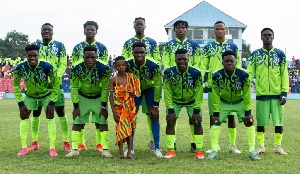- Home - News
- Elections 2024
- News Archive
- Crime & Punishment
- Politics
- Regional
- Editorial
- Health
- Ghanaians Abroad
- Tabloid
- Africa
- Religion
- Photo Archives
- Press Release
General News of Monday, 14 April 2025
Source: www.ghanawebbers.com
Feed Ghana success depends on effective management – Edward Kareweh
Edward Kareweh, the former General Secretary of GAWU, emphasized effective implementation for the Feed Ghana Programme's success. The government aims to support 50 farmers this year. They plan to raise four million birds and produce 10,000 metric tons of chicken. This initiative is part of the ‘Nkukoko Nkitikiti’ project.
Kareweh spoke with Citi News about involving stakeholders for success. He noted that management skills are crucial for effective implementation. Resources must be used efficiently in the poultry industry.
On April 12, President John Dramani Mahama outlined key interventions under the Feed Ghana Programme. This initiative aims to modernize agriculture and boost food security. It supports Ghana’s economic transformation as part of his Agriculture for Economic Transformation Agenda (AETA). The programme seeks to create jobs and reduce food inflation.
Mahama announced four main interventions:
1. Promotion of Smart Agriculture: The government will establish Farmer Service Centers nationwide. These centers will offer mechanization services, quality inputs, financing, market access, processing, and training for farmers. The programme will also create “farm banks” in irrigable zones to support young agricultural entrepreneurs.
2. Grains and Legumes Development Project: This intervention focuses on increasing maize, rice, soybean, and sorghum production. These crops will be cultivated for local use and export. Special attention will be given to sorghum due to its brewing potential.
3. Vegetable Development Project – ‘Yiridya’: To cut vegetable imports, the programme promotes greenhouse farming and urban agriculture. Mahama encouraged schools and households to grow vegetables like tomatoes and onions at home.
4. Institutional Farming: This component engages schools in crop and livestock farming on available land. It aims to improve meal quality for students while reducing costs.
Mahama stated that these initiatives would revitalize agriculture in Ghana. They aim to enhance self-reliance and position Ghana as a key player in regional food markets under the African Continental Free Trade Area.











